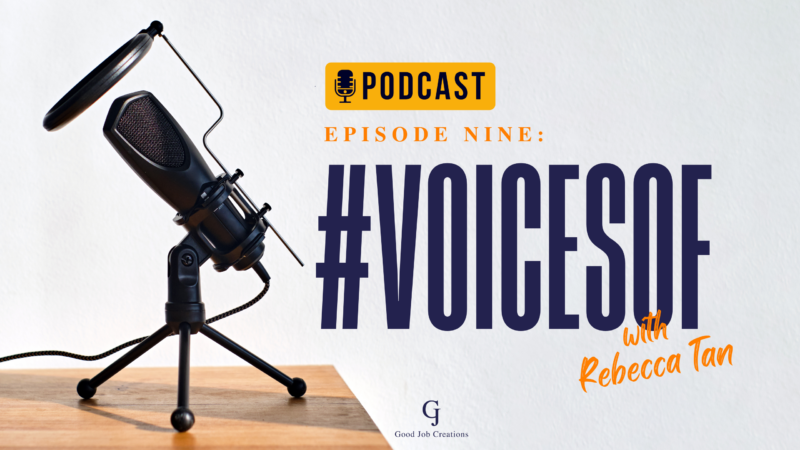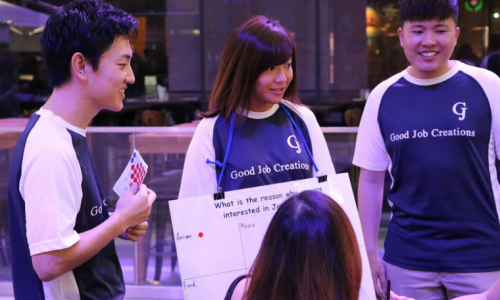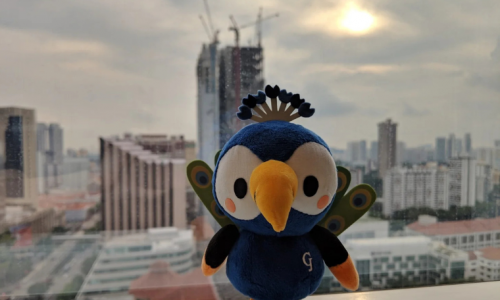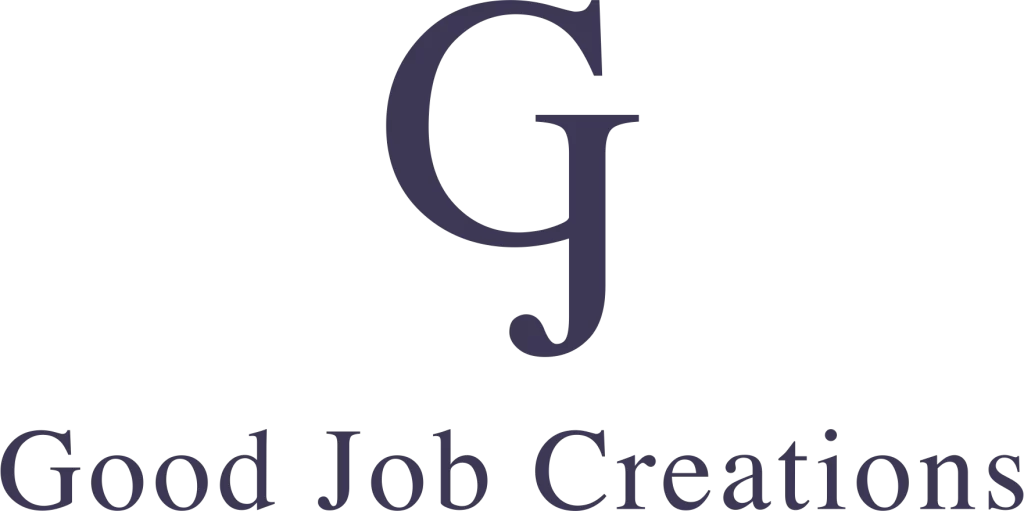Transcript of podcast:
Destiny: Welcome to GJC’s podcast, I’m your host Destiny Goh.
In an era where speed, skill, and scope greatly matter, everyone seems to anticipate the next big thing. Whether it’s technology, software, or service, they want to know what it can do for them and then reap the benefits of it.
But occasionally a glitch happens, and it undergoes numerous updates, rebuilding and refining until it becomes a desirable product.
This analogy is likened to humans—their strengths and weaknesses; how some people learn to thrive in challenges by embracing, but also working on refining their flaws.
With me today is Rebecca, a Consultant who’s been working for over a year in GJC, who will be sharing more of her career journey, her opinions, and her experiences on various matters of the Recruitment industry.
Rebecca: Hello, thank you for having me.
Destiny: So, Rebecca, before this if I remember correctly, you were working as a Sales Coordinator for a manufacturing company, and you made quite a switch into the Recruitment industry.
Rebecca: Yes, I did.
[00:44] Destiny: This role you’re currently in, a Window Person and Consultant, requires you to source and hunt for the best-fit candidates, liaising between clients and candidate management.
[00:44] Destiny: This role you’re currently in, a Window Person and Consultant, requires you to source and hunt for the best-fit candidates, liaising between clients and candidate management.
What was it like for you as you coped in a new, unfamiliar environment?
Rebecca: Well, perhaps I must backtrack a little. For me, navigating a new, unfamiliar environment wasn’t easy at first. Especially with my limited background and knowledge in the field of Recruitment and Construction Engineering, despite the initial challenges, such as product knowledge and learning the reins of stakeholder management, I persevered.
I reminded myself to maintain a positive mindset and to seek guidance from my experienced team members, especially when navigating the unknown. It took time, of course, but gradually things started to smooth out.
For this, I want to give some credit for the support and guidance I have gotten from my team, for helping me to overcome the initial difficulties in adapting to this environment.
[01:56] Destiny: So, you mentioned maintaining a positive mindset with your team members helped you learn better, can you share with us a situation where you practised such a ‘positive mindset’?
Rebecca: I feel that some people, including myself, tend to feel nervous when they are in a new environment or challenges that force them out of their comfort zone.
Eventually, some people choose to run away or use more negative emotions or ways to face this. As for me, I tell myself to try to take things as they come— one step at a time. Of course, these decisions took some time.
When I first joined GJC, I remember feeling intimidated by people’s facial expressions, actions, or how they would communicate.
This tends to make me shy away, like feeling unwanted, or shut myself out entirely. However, I realised a positive attitude stems from a positive mindset.
Your actions are shaped by your thoughts, and that encouraged me to take the first step. Because I knew my motive was to integrate well with my team, to learn, trust, and for collaborations to occur.
What I’m trying to say is, that cultivating a positive mindset really takes effort but it’s not impossible either. Lay out the pros and cons of a situation, and figure out the outcome you want to achieve with a positive attitude, and don’t overthink it.
Destiny: I agree. I think it’s not impossible to really cultivate a positive mindset, but I believe it needs to be done intentionally.
Or perhaps, sometimes, talking to a trusted friend or mentor might give you a clearer picture of the challenging situation you’re facing.
[03:38] Okay, so I have a burning question for you. I’m sure you get a lot of applicants who switch jobs only after working for a year or so because to them, job hopping from one to another stands a chance of getting higher pay than the last.
So as a Consultant like yourself, what are your thoughts about this? Is this a smart move to go with?
Rebecca: Yes, surprisingly, I do receive applications as such. But to be clear, it’s neither right nor wrong. I suppose at the end of the day, it really depends on what the person is looking for.
Some people might reason that one should stay longer to gain experience or learn as much as you can before you move, another person might quit because there isn’t room for growth, or perhaps they are in a different season in life, and they want different things.
For example, they are looking to get a house, pay their children’s tuition, and all those need a hefty sum of money. But my advice varies with the age group I’m dealing with.
Being with the engineering and construction portfolio, perhaps I’ll use some real-time examples from there.
For younger applicants, I’d ask them, like, what they are looking for, and run through it with them, their interests, prior experience, and try to find them the best fit role.
I think, it’s important to map out their career journey to give them an outlook of what their career journey in a company might look like, but then again It might change some months or years down the line.
Other factors of job hopping could be the absence of career growth, like I mentioned earlier, poor company cultures and leadership might also influence job hopping.
But at the end of the day, I do advise my applicants to learn as much as you can, get hands-on experience, and keep track of your progress because it all comes handy someday.
Destiny: Oh, I find that what you said to be such an eye-opener. I like the fact that you didn’t make it a one-size-fits-all advice, but instead, you really listened and empathised with the individual’s situation.
[05:39] So, when you’re sourcing for people for an open role, what’s the process like between finding someone that’s best fit for the role or the right person for the job?

Rebecca: Interesting question. Well. I’d say it’s easy to find the right person for the job, but finding the best fit for a role takes effort, it’s like finding a needle in a haystack.
I think the right people in this case might often have all the right skills and certificates you want, but they might not necessarily work well with team dynamics, or chemistry, as they call it.
They might not be as teachable as we thought; they know they are hired due to their qualification or perhaps their communication skills are lacking too. But that’s the beauty of it: you get others on board to fill in the gap for what one person is lacking, and that’s pretty much the core of teamwork.
Whereas, compared to a best-fit, these people usually are more open to learning and they are hungry for more because they are aware they don’t necessarily check all the boxes.
But they might have the experience or desire for career growth, and they might possess the soft skills needed, and it might be the golden opportunity for some.
[07:00] Destiny: I understand that you mentioned that there was some downtime where your sales weren’t doing so well. So do you see it as a you-problem? How do you navigate through those seasons?
Rebecca: I think it gets pretty competitive out there in an environment where sales target is often involved. Yes, part of it, I feel it was a you-problem because I felt the extra pressure to perform.
Recognising my closed-mindedness as a weakness was pivotal. There was a time when I firmly believed that my approach to tasks like resume search, candidate management, and interactions with candidates was always the best way through this.
Such a flaw became apparent during a challenging period of low sales performance, adversely affecting my job as I rejected feedback and dismissed alternative methods given by others. But as the results showed, I knew something needed to be done.
[07:56] Destiny: So, was there a reason that caused you to reject feedback?
Rebecca: Back then, I used to reject feedback because of my high self-esteem, believing strongly in the rightness of my actions. When someone pointed out my flaws or mistakes, I felt embarrassed, thinking that a small error shouldn’t have happened and afraid it would make others look down on me.
Yeah, it sounds silly, but in the working world, you don’t really want to show others what you are not good at, and only what you are capable of.
However, my perspective shifted when I chose to confront these small issues. I began to appreciate it when someone pointed out my mistakes, recognising that it was because they cared about me to do so.
I realised that I need to be my own advocate when others are trying to help me. If I don’t do this for myself, who will? These thoughts emerged after I understood that running away from such a situation was a mistake.
And through the insights from my managers and much self-reflection, I slowly began to acknowledge that my methods weren’t the best approach.
I allowed pride to get in my way, thinking that everything I knew was correct.
[09:08] Destiny: So, as a Consultant, I understand there’s KPIs to hit, which then reflects your performance ultimately.
And what are some aspects do you consider as weakness, that you realise would potentially affect your performance?
Rebecca: In this case, for instance, I used to believe that going through a candidate’s skill set or experience with key points is crucial, and that’s pretty much it.
But I suppose I neglected building relationships and understanding their needs; I also didn’t bother to ask about their future plans or any concerns that might arise.
Another weakness was that my conversation style was casual, and I didn’t carefully choose words or phrase sentences. Some people pointed out that I sounded fierce or unhappy when I was talking to the candidate, but I didn’t care much and thought I was doing it right.
Destiny: I think it’s really great that you became self-aware. But I suppose you had your fair share of contemplating whether to work on your weaknesses or just sweep them under the rug.
So what triggered your need to improve? Was it the feedback you’ve been getting or the results?
Rebecca: As much as I don’t want to admit, yes, the result wasn’t showing, and my daily operations were not up to my standard. It has made me feel it’s time for a change.
If I don’t change now, I might stay this way forever—being complacent and getting satisfactory results forever. Coupled with that, It is also not easy to be pointed out by others.
So, I told myself that if I’m not willing to change, even for myself, I might just lose out on other opportunities for growth. It was a turning point in my life.
Destiny: Well, that’s so great that you finally took the opportunity to really self-reflect— there was a lot of self-reflection that went behind the scenes.
[11:02] So, now let’s discuss about mental health.
Can you describe what it was like back then, when you struggled to cope with the pressure to perform well, coupled with the feedback that you were getting, how do you strike a balance in keeping up and showing up?
Rebecca: Wow, thanks for asking. Well, I think we are all like salesperson in our own way; every other day, we try to sell ideas or project pitches, and in my case, it’s candidate placement and staffing.
Honestly, it can get quite challenging, as we have to deal with figures and numbers. Of course, we feel more relaxed when the figures are good, and stressed when the numbers are falling beneath a target.
I used to think that numbers never lie, so I felt even more stressed when my sales performance was not ideal, which resulted in me overworking on many occasions. However, it came to a point where I realised working around the clock wasn’t going to be very sustainable in the long run. And that I should plan and execute instead of blindly doing things.
As an attempt to strike a balance, I reminded myself to take one step at a time and not result to overthink and overstressing when the numbers are not ideal. Instead, I should think about why the sales are good, and why they are low, and like what are the key things changed behind the scenes?
Understanding the situation greatly helped me develop a better plan and learn something valuable.
I also encourage myself to take a break, think, plan, and restart. And this improved things and prevented me from draining my energy and mental resources. It gives me a chance to recharge and boost my energy.
In the grand scheme of things, adopting a measured and thoughtful approach contributed to the long-term sustainability of our efforts. Also, it’s a reminder that recognising challenges and actively seeking solutions enhance professional capabilities and nurture resilience, turning the tough moments into invaluable learning experiences.
Destiny: Wow, I’m so happy for you that you found your breakthrough because it’s never easy to have so many things going on at once. And to find the silver lining of things really does require much effort on your part.
Rebecca: Yes, I agree.
[13:38] Destiny: So, the big question is, how do you thrive while embracing your flaws and imperfections?

Rebecca: I think the first step was identifying the areas I wanted to change. I went old-school, and made a list of what I wanted to improve, and that action helped me to set a clearer direction and the mindset I chose to settle with—I guess you could say it’s my little roadmap for improvement.
Next, which I think was so important, was the community I surrounded myself with. I knew change would take a significant amount of time, but I also knew I couldn’t do it alone either.
I needed support from people I could trust. I have a few close friends who I share my struggles with, and they have been a great help, in helping me compartmentalise, and their empathy was something I’m grateful for.
I believe speaking to experienced elders can really help, because they give practical solutions to me.
Destiny: Because of their experiences.
Rebecca: I suppose, ultimately, to really thrive is to understand imperfections are a part of life.
I made it a point to continually learn and grow from my experience, applying the lessons I gathered from self-reflection and the wisdom of others.
Such a process greatly helped me to navigate challenges with greater resilience and openness to change.
[15:21] Destiny: Wow, I like the fact that you got other people involved instead of doing everything yourself because I feel that sometimes having a community that really understands you and who pushes you toward growth, is so much help to someone’s personal growth.
And so, throughout this process of embracing and working on your weaknesses, do you feel like you were building something or were looking to gain something out of that entire season?
Rebecca: Oh, for sure, yes. I was hoping to get something out of the effort and time I put into improving my performance and development. Of course, back then, I didn’t exactly have it all figured out from the start. But the desire to improve was the catalyst for change to take place.
I didn’t realise this almost immediately, but as I faced challenge after challenge, and unwilling to back down, I built resilience. Resilience encouraged me to bounce back from adversity, learn from failures, and maintain a positive mindset when facing difficulties.
To me, tackling and conquering challenges are the perfect opportunity for growth.
Next, I felt like I built adaptability during that season. Speaking from experience, it wasn’t easy for me to embrace change or adjust quickly to new circumstances.
I would watch how others handle situations—I learned from their mistake and success, then improvise.
The ability to adapt helped me to navigate various environments and contribute significantly to my personal and professional growth. Change is the only constant. By cultivating adaptability, you’ll survive and thrive in an ever-evolving world.
And finally, this is something I feel is so important that it links closely to what I was sharing earlier on mental health. Cultivating self-love is fundamental to a healthy mental health journey. Accept yourself, acknowledge your worth, and prioritise self-care.
Building a positive relationship with yourself can positively impact your mental well-being. And I feel that it helps you to navigate stress and maintain a healthier perspective on life.
And be kind to yourself, that’s what I think.
Destiny: Oh, that’s so good, being kind to yourself.
So thanks for sharing, Rebecca, for bringing me along on your journey of self-discovery and growth. It’s been a real pleasure speaking to you.
Rebecca: The pleasure is mine.
Destiny: Yeah, and I think there are so many useful and actionable pointers here that our listeners can potentially benefit from, especially if they’re struggling to find balance in their career and personal lives.
I guess the parting statement for today is: to be kind to yourself, to always look for and create opportunities for growth.
Thank you for listening to GJC’s podcast. See you soon, next time.
Podcast written and edited by Destiny Goh
Marketing Communications Executive





